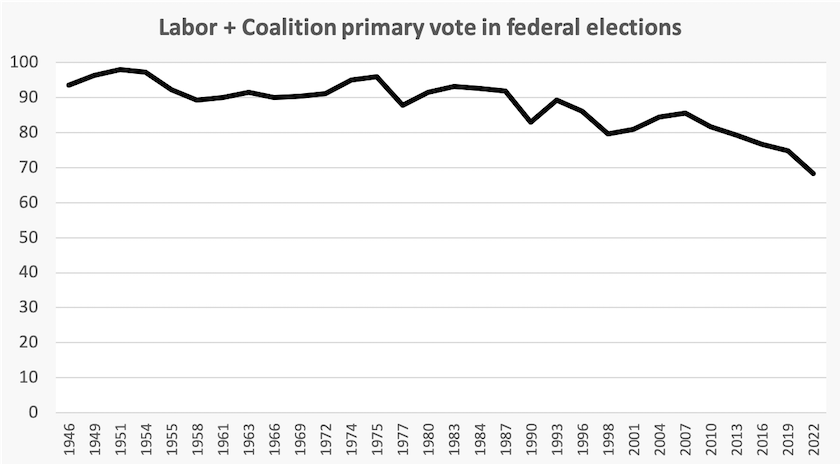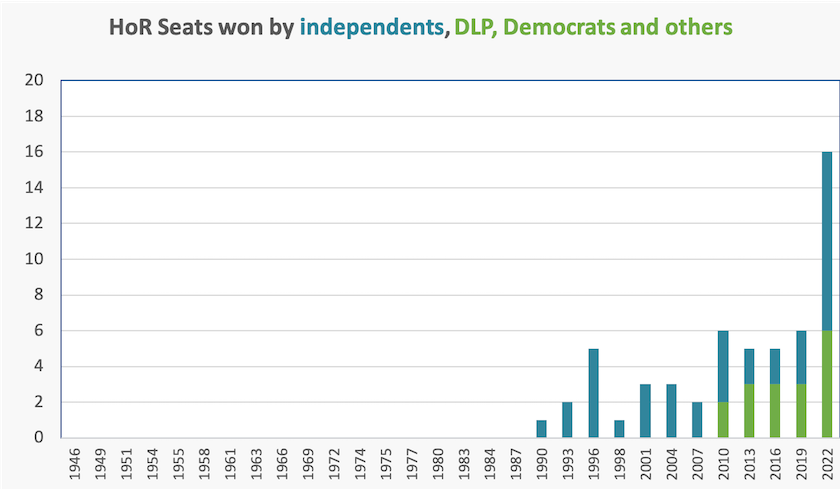Possibilities of election reform
How the government intends to deal with fake news, misinformation, conjured facts and lies in political discourse
The Voice referendum unleashed a torrent of lies and misinformation as we have not seen in Australia, notable not only for the intensity of its blatant lies, but also for some of its vile content. In times past such filth would not have made it past the range of a soapbox in the speakers’ corner (where it would have been met with an instant audience response), but social media has no such natural constraint. Also in the campaign right-wing opponents of the Voice made ample use of traditional media to spread lies and misinformation.
On ABC Breakfast on Tuesday Thomas Mayo said:
We were running an honest campaign. The “yes” campaign always had to talk about what the actual change is, whereas the “no” campaign could talk about anything. And they did. They talked about anything other than what the actual alteration to the constitution was. They had fearmongering. There are reports and numerous analysis of how they sponsored social media accounts that had contradictory messages. The media really struggled and failed somewhat to expose all of that in a way that got through to Australians.
He went on to say that “no one could have predicted that Trump-style politics could be imported into this country in the way that they were”, and described some of the outrageous claims of the consequences of a “yes” vote. “The opposition parties led by Peter Dutton chose to lie”, he said: Thomas Mayo on the Voice defeat and where to from here.
The government has a draft bill to combat misinformation and disinformation. The Guardian’s Amy Reynolds explains its workings: Why is Labor’s bill on combatting disinformation so controversial?. Although the bill is rather weak – most notably it does not give the Australian Communications and Media Authority strong “take down” powers – it has been confronted by a predictable response from Sky News (we will have a “ministry of truth”). The Australian Christian lobby (a group that uses the term “Christian” in ways that do not necessarily relate to the New Testament) claims on its website that “The government would be the ultimate authority of truth. Ideological conformity would be enforced in Australia.”
There are also concerns expressed by the Human Rights Commission and the Australian Law Council. These are more nuanced and carefully-directed than the scaremongering of groups on the authoritarian right. Amy Reynolds believes that the exposure draft, as it stands, is unlikely to be the government’s final version.
James Robinson, writing in The NewDaily, reports that following the success of the “no” campaign the Coalition-aligned Advance Australia is running a scare campaign against the bill asserting that “All the usual suspects are lining up – Labor, the Greens, the Teals – to call for new laws that will criminalise and police what you say”.
In fact Australians are strongly in favour of truth in political advertising laws. The Australia Institute conducted a poll straight after the Voice referendum, finding that 87 percent of respondents agree that truth in political advertising laws should be in place in time for the next federal election campaign. Even among those who voted “no” 83 percent agreed. Respondents’ concerns were particularly about lies and misinformation on social media.
We may not be able to do much about the fake news coming in from both sides in the Russia-Ukraine war, or the Israel-Hamas war, but surely we can do something about what is generated in Australia, without compromising our right to engage in argument in the public domain. Some may naively claim that such regulation is inevitably an assault on free speech, but free speech is all but dead when the voices of reason are drowned out by an enduring roar of lies.
How the government plans to deal with election funding
William Bowe reminds us that the Joint Standing Committee on Electoral Matters will present its final report on the 2022 election next month. It has already presented an interim report.
Mike Seccombe has a Saturday Paper article – The bipartisan deal designed to thwart independents – summarizing and analyzing the interim report.
It has some positive recommendations, including real-time disclosure of donations, donation spending caps for political parties, and a reduction of the threshold at which donations to political parties must be disclosed, from $15 200 to $1 000. Unsurprisingly the Coalition, in its minority report, is unenthusiastic about these reforms.
Seccombe explains that the bill also sniffs of a recognition that Labor and the Coalition have a shared interest in reclaiming ground they have both lost. He writes:
They [Labor and the Coalition] might not agree on much, but they are united in one goal: the preservation of their duopoly. Even as they fought the big fight over the referendum, they were quietly working towards a bipartisan position on a suite of reforms to the electoral system, designed to protect their dominance.
As a reminder of the two big parties’ combined losses, below are two graphs of electoral trends going back to 1946, the first election following the formation of the Liberal party. The first is of the combined Labor + Coalition vote.

The second is the number of House of Representative seats won by independents and small parties. Note that nothing happens for a long time, until a dam wall starts to crumble.

That pattern has an explanation in preferential voting. Once the vote for either main party falls far enough, preferential voting gives independents and small parties a good chance.
Mike Seccombe notes that the provisions in the draft bill would make it hard for new independents to get elected. Also he notes that while they would put an end to the sort of campaign Clive Palmer ran, they would also make it hard for a body like Climate 200 to support candidates.
It is notable that while the Greens have only minor comments in their minority report, Kate Chaney and David Pocock have minority reports calling for quite significant changes. Pocock calls for a review of provisions for territories’ representation in the Senate (going for 6 each in the NT and the ACT), and for “an independent body to manage and rule on truth in political advertising complaints”.